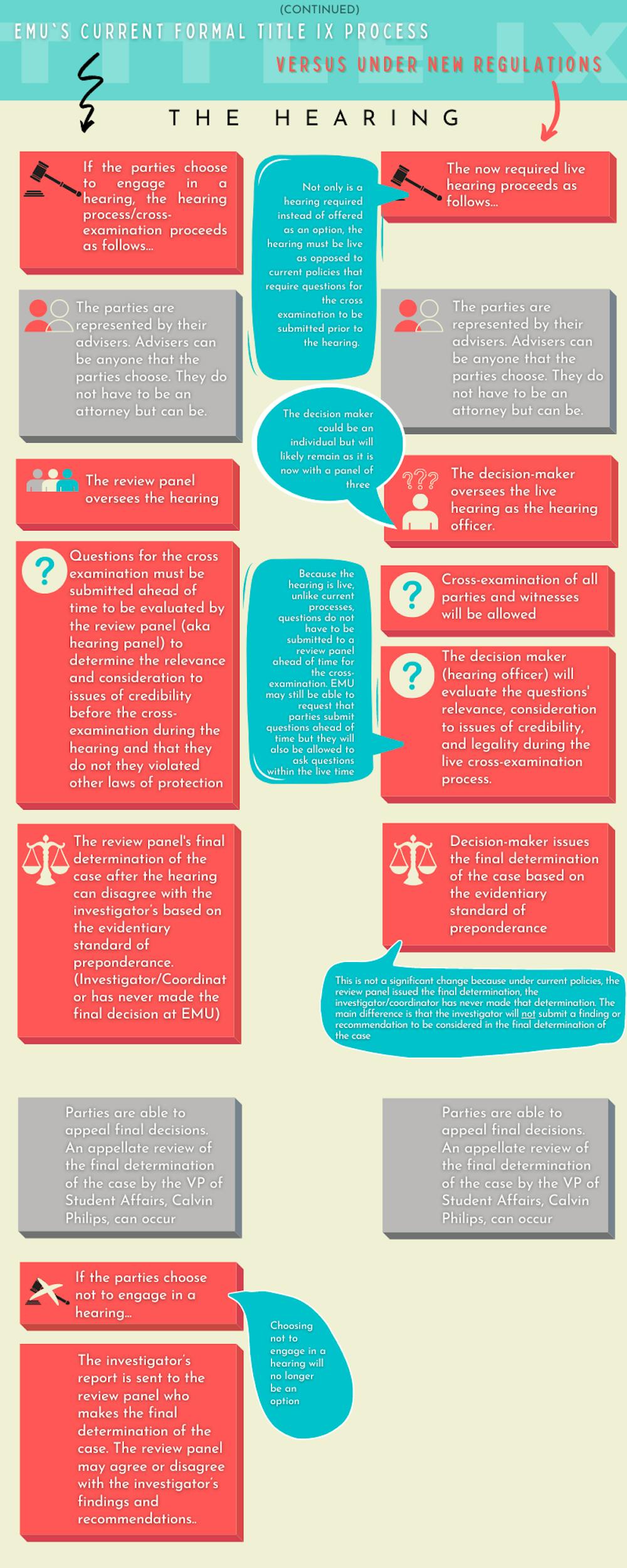The US Department of Education released new Title IX regulations earlier this year on May 6, that will go into effect on Aug. 14, 2020.
Title IX states, “No person in the United States shall, on the basis of sex, be excluded from participation in, be denied the benefits of, or be subjected to discrimination under any education program or activity receiving Federal financial assistance.”
Title IX applies to a range of instances of sexual discrimination from equal access to collegiate level sports to sexual harassment and sexual assault.
EMU’s Interim Title IX Coordinator, Anika Awai-Williams spoke with the Echo about the most prominent changes to Title IX and what those changes will look like at EMU specifically.
The changes identified throughout this piece specifically address Title IX policies as they relate to EMU. These policies will look different from one institution to another. The changes described throughout this piece will be specific to EMU.
Changes new regulations bring to EMU
EMU’s current formal process versus the new
Below is the current basic formal complaint process versus the new.
“In some sense, it’s going to be kind of like a pseudo court hearing,” Awai-Williams said about the new hearing process.
These are not the only policies subject to change in Title IX.


One evidentiary standard must be used for all disciplinary processes. EMU will continue to use the evidentiary standard of preponderance
Title IX regulations will officially require institutions to use the same evidentiary standard for every disciplinary process no matter if it involved faculty or student misconduct.
They may choose between the “preponderance of the evidence” or “clear and convincing” standard.
At EMU, there will be no change because they are currently in compliance with this regulation. EMU uses the preponderance of the evidence standard and will continue to do so.
There are three levels of evidentiary standards. The preponderance of the evidence is the lowest level.
Preponderance of the evidence: It must be more likely than not, or at least 51% evidentiary, to establish whether or not a violation has occurred.
Clear and Convincing: This is a more stringent standard. It requires a lower level of doubt
Beyond a reasonable doubt: This is the evidentiary standard used in the criminal justice realm. It is not used in Title IX processes.
No matter the alleged misconduct, whether it is plagiarism or sexual assault, the same evidentiary standard will be used across the board.
Appellate reviews for emergency removal
Parties are able and will continue to be able, to appeal the final determination of a case. This appellate review is by the Vice President of Student Affairs, Calvin Philips.
However, under new regulations, individuals who have been subject to an emergency removal will be able to appeal those decisions as well. Additional staff will be added for this type of appellate review.
Obligations off-campus
Although colleges are not obligated to respond to reports of sexual discrimination and misconduct off-campus unless it occurs in an officially recognized student organization, Awai Williams said EMU may still be able to apply Title IX policies to other off-campus incidents.
“Title IX policy is applicable to, subject to, and protects all students, faculty, and staff oversees the entire campus community including students, faculty, and staff,” Awai-Williams said.
Title IX Office’s are required to respond to complaints from all institutional, educational programs and activities, and may include off-campus educational activities and programs specifically connected to the institution, including Greek Life.
“The previous regulations that were initiated back in 2011 by the Obama Administration wanted to create kind of, in my opinion, a wider net to allow institutions, [including] K-12 [schools}, but specifically higher education [institutions] to be able to have jurisdiction over their community members in regards to addressing sexual discrimination,” Awai-Williams said.
She said new Title IX regulations are more “nuanced” in terms of the Title IX Office’s jurisdiction regarding what can be adjudicated as formal Title IX complaints.
“We are currently assessing the definition of educational programs and activities in the new regulations to determine our institution’s jurisdiction to address incidents of sexual discrimination and sexual misconduct that occur off-campus, but that directly affect members of our community,” Awai-Williams said.
“So even if things may happen off-campus, I think that we have some discretion to say that if the individuals that are party to an incident, even if it happens off-campus, we [may] have jurisdiction over those individuals. Those are still our students, those are still our employees, and those are still our faculty.”
Nonetheless, there may be more obstacles in reporting off-campus sexual misconduct for both the complainant and in the university’s ability to apply Title IX processes.
Stalking, domestic violence, and dating violence will be officially considered examples of sexual harassment under Title IX.
In addition to rape and sexual assault, stalking, domestic violence, and dating violence will be officially considered sexual harassment under Title IX.
Because these examples of sexual harassment were already included in EMU’s policies, there will be no change other than the terminology and the backing of federal law. Currently, EMU’s Title IX Office uses the terminology “intimate partner violence.”
Institutions are longer able to have discretion in those definitions or terminology. EMU will use the terminology “dating and domestic violence” and comply with state definitions effective Aug. 14.
The definition of sexual harassment will become more narrow.
The definition of sexual harassment under student conduct will be more narrow with new Title IX regulations.
The current definition of sexual harassment is, “any unwelcome conduct that a reasonable person would find so severe, pervasive or objectively offensive that it denies a person equal educational access.”
For employee conduct, this definition will remain the same.
However, new regulations require that under student conduct the definition will be, “any unwelcome conduct that a reasonable person would find so severe, pervasive and objectively offensive that it denies a person equal educational access.”
This subtle but important change in the definition of sexual assault under student conduct stipulates that, for conduct to be established as sexual harassment, the conduct must be severe, pervasive, and objectively offensive as opposed to just one or more of those elements.
“[Under the current policies] you can parse out if something is pervasive, and it might not be severe and it may not even be objectively offensive but if you can prove pervasiveness you may still find somebody responsible under sexual harassment,” Awai-Williams said.
Reports of sexual assault, dating violence, domestic violence, and stalking do not need to meet the description of “severe, pervasive, and objectively offensive.”
This new regulation will make it more difficult to establish conduct as sexual harassment under Title IX.
New policies change the Title IX Office’s reach outside of the US
Colleges will not be obligated to address reports of sexual harassment occurring outside the US, this includes study abroad programs.
According to Awai-Williams, EMU may still respond to these reports if they are able.
“The writing is very specific in that Title IX does not have jurisdiction outside of the US,” Awai-Williams said.
EMU’s Title IX Office is still trying to figure if they have jurisdiction in instances of sexual discrimination and misconduct on study abroad programs.
New regulations stipulate that multiple informal complaints against the same individual do not warrant a formal complaint process
Currently, if a Title IX office receives multiple informal complaints against the same individual, they will not be required to begin a formal process.
Informal complaints are defined as any complaint where the complainant does not wish to engage in a formal process.
Under current policies, institutions can conduct a “risk assessment” of multiple informal complaints against the same individual if no complainants wish to engage in a formal process.
If they evaluate the individual to be a potential threat to the community after the risk assessment, the institution can proceed with a formal process by acting as a party themselves. Those individuals who submitted informal complaints can be used as a witness in a formal complaint process if they do not want to be named as a party.
EMU’s Title IX Office is still determining if this is still an option going forward. Institutions will not be required to begin a formal complaint process after receiving multiple complaints against the same individual and it is unclear if they will be able to choose to do so.
If universities do not have this option, there is potential for possibly dangerous individuals to evade disciplinary action through Title IX.
Materials used to train employees in Title IX must be published on the institution’s website
Institutions will be required to train all staff involved in the Title IX process and publish those training materials on their website.
Training must include a review of the new sexual harassment definition, conducting informal and formal processes, and how to “serve impartially.”
There is no specific time frame for responding to reports other than “reasonably prompt.”
There is no specific timeframe for institutions to respond to reports of sexual discrimination and misconduct. Institutions still have to be “reasonably prompt” in their response and with the entirety of Title IX processes.
Awai-Williams told the Echo she typically responds to reports within 24 hours by email. She reaches out to the disclosing party/parties to inform them of their options for informal processes or if they wish to proceed with a formal Title IX process.
Complaints can only be filed against those who attend the university
According to Know Your IX, this rule means that "if you are assaulted at the school across the street, you have no right to open a Title IX complaint against that person on your campus. This will force students to turn to law enforcement or additional legal routes to ensure that their perpetrator will be held accountable and will cause no further harm.”
The scope of “responsible reporters” may shrink.
Under the Clery Act, all employees are required to report any knowledge of a possible crime. Rape, sexual assault, stalking, domestic and dating violence are examples of crimes that employees are required to report that are also covered under Title IX.
However, in the case of non-criminal sexual harassment or discrimination, the scope of responsible reporters may shrink
Under current policies, per the 2011 Obama Administration guidelines, when an employee is made aware of possible non-criminal sexual discrimination or misconduct, it is considered actual notice.
When an employee receives actual notice of possible instances of sexual discrimination or misconduct, they must report to the Title IX coordinator as “responsible reporters.”
Employees could include Residential Advisers, athletic coordinators, custodians, and more.
Under currency policies, institutions have the discretion to determine who is a mandatory or responsible reporter.
New regulations stipulate that actual notice is reserved for the Title IX coordinator. Only “officials with authority” who can institute corrective or remedial measures in regards to any reports, or possible allegations, of sexual discrimination or misconduct, are required to report to the Title IX coordinator.
Institutions retain the discretion to determine who these “officials with authority” EMU’s Title IX Office is still determining what change if any, this new rule brings.
Awai-Williams concerned reports of non-criminal sexual harassment/discrimination will decrease if all employees are not considered responsible reporters.
“That’s a little bit concerning for a lot of schools because that means that you are shortening the scope of who is responsible for sharing that information with the Title IX Office,” Awai-Williams said. “So actual notice is now only I know. But I’m one person. I don’t live in the residential halls and I’m not in athletics and I’m not all over the place. I’m one person. So if I don’t hear about it, it’s not actual notice anymore, which also means that there could be something that’s happening on campus or happening to our community and I don’t find out about it and there’s still harm being done.”
Because there is some discretion for institutions in this area, there are ongoing discussions at EMU regarding what may change and how to be compliant with new Title IX regulations in this area.
Awai-Williams said she would advocate for the scope of responsible reporters to remain the way it is now.
Raising the liability standard for institutions
According to Know Your IX, unless schools have proved to be “deliberately indifferent” to sexual harassment.
This change results in less accountability for institutions that ignore sexual misconduct.
Many changes in a short amount of time and amidst a pandemic
Awai-Williams told the Echo that an important part of any Title IX process is staying in contact with the parties every step of the way.
“We would like to make sure that if the regulations themselves are the floor of compliance, we would like to continue to be the ceiling of compliance because the whole point of Title IX, is to address sexual discrimination so it doesn’t displace our students, our faculty and our staff from our institution due to harm,” Awai-Williams said. “We want to be able to continue to do that in the best way possible and to be all-inclusive in that,”
Awai-Williams and other institutions have been given these long-awaited new Title IX regulations during an inopportune time. The document is over 2000 pages long.
We’ve been waiting three and a half years for the Department of Education to release their new Title IX regulations, and when the new regulations were finally [released], unfortunately, they dropped them in the middle of COVID-19 and gave us a very limited amount of time for institutions to make these corrective compliance issues,” Awai-Williams said.
Title IX activists have criticized many of these changes will make it more difficult for people to report sexual misconduct and assault.
Those who wish to report an incident of sex discrimination can do so on EMU’s Title IX Office’s website. For criminal incidents, the Department of Public Safety can be contacted as well.
Students may also contact Counseling and Psychological Services. The services offered by CAPS are confidential. They are not mandated to report to the university or police.
The information above is that EMU’s Title IX Office’s specific policies. For those interested in more general information on the new Title IX regulations, visit Know Your IX.










